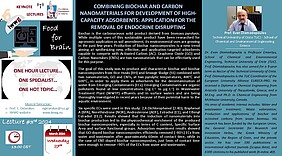Em. Prof. Evangelos Gidarakos of the Technical University of Crete continues this year the series of online lectures on hot issues of waste management, entitled "FOOD for BRAIN".
On Wednesday 27th March 2024 at 13:00 CET, Em. Prof. Evan Diamadopoulos of the School of Chemical and Environmental Engineering at the Technical University of Crete will focus on the development of high-capacity adsorbents and their application in wastewater treatment.
Anyone interested may participate through this link: ZOOM Meeting
Title
Combining Biochar and Carbon Nanomaterials for Development of High Capacity Adsorbents: Application for the Removal of Endocrine Disrupting
Abstract
Biochar is the carbonaceous COMPOUNDS FROM WATER solid product derived from biomass pyrolysis. While multiple uses of this sustainable product have been researched for agronomic application as soil amendment, its environmental uses are growing in the past few years. Production of biochar nanocomposites is a new trend aiming at synthesizing new, effective, and application-targeted adsorbents capable to compete with Activated Carbon (AC). Graphene Oxide (GO) and Carbon Nanotubes (CNTs) are two nanomaterials that can be effectively used for this purpose. The goal of this study was to produce and characterize biochar and biochar nanocomposites from Rice Husks (RH) and Sewage Sludge (SS) combined with two nanomaterials, GO and CNTs, at two pyrolytic temperatures, 400℃ and 600℃, in order to apply them as adsorbents for the decontamination of water from Emerging Contaminants (ECs). Emerging Contaminants are organic pollutants found at low concentrations (ng L -1 to μg L -1 ) in Wastewater Treatment Plant (WWTP) effluents and in surface waters and are being thoroughly investigated in recent years because of their potential harm to the aquatic environment. Six specific ECs were used in this study: 2,4-Dichlorophenol (2.4D), Bisphenol A (BPA), Norethindrone (NOR), Androsterone (ADT), Estradiol (E1), and Ethinyl Estradiol (EE2). Results showed that the induction of nanomaterials into biochar production led to the physicochemical enrichment of the produced biochar nanocomposites, especially in terms of C content, Specific Surface Area and surface functional groups. Adsorption experiment results showed that GO-doped biochar nanocomposites efficiently removed (>80%) ECs from water and wastewater after approximately 60min of contact time, while in the case of CNT-doped biochar nanocomposites, just 5min of contact time were enough to remove >90% of the ECs from water and wastewater.
Short Bio
Evan Diamadopoulos is Professor Emeritus of the School of Chemical and Environmental Engineering. From December 2017 until August 2022 he served as the elected Rector of the Technical University of Crete. From November 2020 until now, he serves as the Chief Scientific Officer for the Technical University of Crete in the collaborative project between nine European Universities to create the European University on Responsible Consumption and Production (EURECA-PRO). He received his Diploma in Chemical Engineering from the Aristotle University of Thessaloniki and his Master's and Doctoral Degrees in Chemical Engineering from McMaster University in Canada. His field of research focuses on environmental technology and waste utilization. He has over 100 publications in international referred journals with over 6,300 citations and an h-index of 40.


